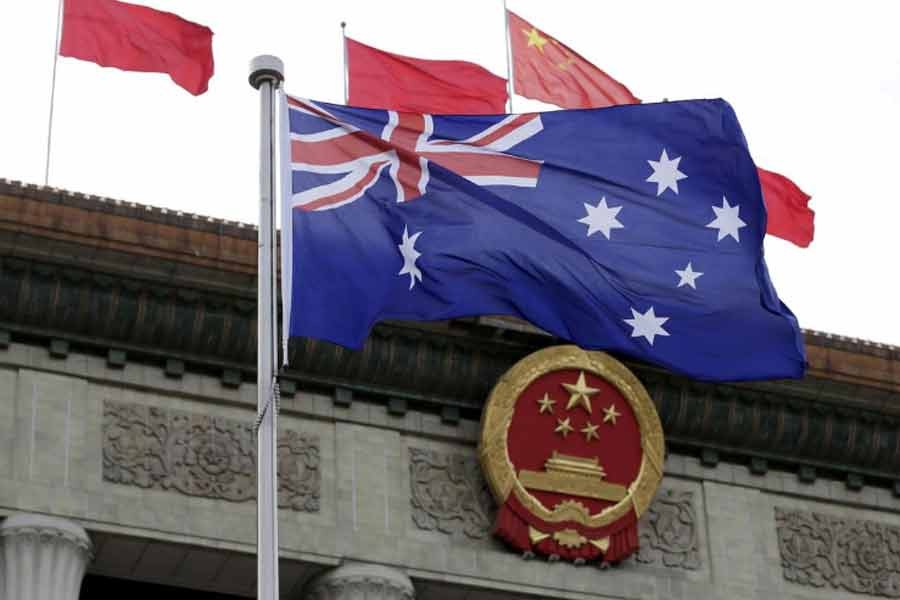Two Australian foreign correspondents were flown out of China for their safety, with the help of Australian consular officials after being questioned by China’s state security ministry, the Australian government said on Tuesday.
The correspondents for the Australian Broadcasting Corporation (ABC) and the Australian Financial Review (AFR) sought shelter in the embassy in Beijing and the consulate in Shanghai as diplomats negotiated with Chinese officials to allow them to leave the country, Australian Foreign Minister Marise Payne said, reports Reuters.
Negotiations over the two journalists, the ABC’s Bill Birtles and the AFR’s Michael Smith, reached the highest level of the Australian government, a source said.
Chinese police entered the homes of the two men, who lived in Shanghai and Beijing, after midnight last Wednesday and told them they were barred from leaving China, Smith said.
“We were concerned it was a coordinated move. That indicates to us it was political. We were the only two journalists left in China working for Australian media,” Smith told Reuters in a telephone interview.
“It felt very, very political. It very much felt like a diplomatic tussle in the broader Australia-China relations,” Birtles told ABC television on Tuesday.
The Australian government had earlier warned the two men to leave China, as tension escalated over the detention of another Australian citizen, Chinese state television anchor Cheng Lei.
Cheng was detained on suspicion of criminal activities endangering national security, China’s foreign ministry said on Tuesday.
Police arrived before the men could catch flights booked for Thursday, however.
“At 12.30 a.m. I was woken by a huge pounding on my front door,” Smith recalled.
Seven police officers entered his home, surrounding him and recording him on video as they read out a statement designating him a person of interest in a national security investigation, though he was not the subject of the case.
“They put a spotlight on my face. It was intimidating. I was getting quite scared,” he said.
Australian consular officials decided “it was best” the duo be able to stay with Australian officials on Australian premises while the issues were tackled, Payne told radio station 2GB.
Smith said he was taken in a car with diplomatic plates and a consular officer collected his packed bags.
Both men stayed with Australian officials for five days until a resolution was reached in which the two agreed to be interviewed by Chinese security officials.
Smith was driven by diplomatic escort to a Shanghai hotel on Monday afternoon, where he was questioned for an hour about Cheng, whom he had once encountered briefly but never spoken to, and Hong Kong, among other topics.
Australian consular officials accompanied the two to Shanghai airport and to the gate.
“DEEPLY REGRETTABLE”
“This incident targeting two journalists, who were going about their normal reporting duties, is both regrettable and disturbing,” the Australian Financial Review said in a statement.
Their departure leaves Australian media organisations with no correspondent in China for the first time since the 1970s.
“It is disappointing that after many years, Australia will not have a media organisation present in China,” Payne told reporters.
On Tuesday, China’s foreign ministry said the questioning of the men was a normal enforcement of the law, to which authorities had strictly adhered during their investigations.
Australia has a tense diplomatic relationship with China, which worsened this year after Beijing vowed trade reprisals and said it was angered by Australia’s call for an international inquiry into the source of the coronavirus pandemic.
Australia had issued a travel warning in July that citizens could be at risk of arbitrary detention in China, advice Payne said “remains appropriate and unchanged”.
The incident comes as foreign journalists face greater difficulty in China. The Foreign Correspondents’ Club of China (FCCC) says a record number of 17 were expelled, through cancellation of credentials, in the first half of 2020.
“The effort to keep foreign journalists in China against their will marks a significant escalation of an ongoing, sustained Chinese government assault on media freedoms,” the FCCC said in a statement.
“The FCCC denounces this extraordinary erosion of media freedoms leading foreign journalists to fear that they could be targets of China’s hostage diplomacy,” it said.


